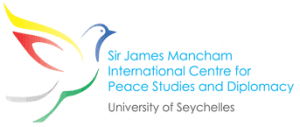 Good politics does not only require solid ideas and plans, but also evidence of what works, and a public debate on what options to pursue. This holds true in any policy field, including foreign and security policy and diplomacy – the areas that Seychelles newest think tank addresses.
Good politics does not only require solid ideas and plans, but also evidence of what works, and a public debate on what options to pursue. This holds true in any policy field, including foreign and security policy and diplomacy – the areas that Seychelles newest think tank addresses.
On Friday the 11th of August, I had the pleasure to attend the inauguration ceremony of the Sir James Mancham International Centre for Peace Studies and Diplomacy (JMPC). Seychelles newest think tank is part of the University of Seychelles and the launch brought together a range of high level policy makers and supporters of the project.
Why is a think tank on peace and diplomacy needed? Peering to other countries that have similar institutions provides answers. In London, Paris, Singapore, Pretoria and elsewhere, think tanks play an important role in developing evidence and ideas for foreign and security policy, in offering a public space for the debate of crucial challenges, but also in training diplomats and policy makers on the basis of state of the art research. These are some of the core roles that the centre will play not only in Seychelles, but also the wider Western Indian Ocean.
Seychelles has an extraordinary foreign policy record. Its diplomats belong to the most successful in the region. Leading the coalition of small island developing states, promoting the blue economy, mediating between positions in organizations such as the African Union or the Southern African Development Community, or chairing the Contact Group on Piracy off the Coast of Somalia successfully for two years, are some of these success stories. With Seychelles now having joined a new club, the club of high income countries, it is time that also its foreign policy progresses to a new level of professionalization. This is where the new centre comes in.
Debating crucial challenges for Seychelles and the region, feeding in expertise to the foreign policy of the country and offering training opportunities are the core objectives of the new centre. While the training programme is under development, and research in areas such as maritime security has just kick-started, the centre has already shown how its events can make a difference in offering thinking space. Earlier this year the centre held one forum on foreign policy strategy and one on reconciliation – core questions for the future of the country. Future events will tackle critical issues such as how to contain illegal fishing activities, or how to interpret the geopolitical situation in the Western Indian Ocean.
The centre is destined to become an intellectual hub for Seychelles and for the Western Indian Ocean region. As an informal tool of diplomacy, it will allow Seychelles to continue its track as a leader in the region. As a knowledge provider, it will inform the regional debate, but also ensure that international actors draw on the adequate expertise of the region.
The centre is destined to become an intellectual hub for Seychelles and for the Western Indian Ocean region. As an informal tool of diplomacy, it will allow Seychelles to continue its track as a leader in the region. As a knowledge provider, it will inform the regional debate, but also ensure that international actors draw on the adequate expertise of the region.